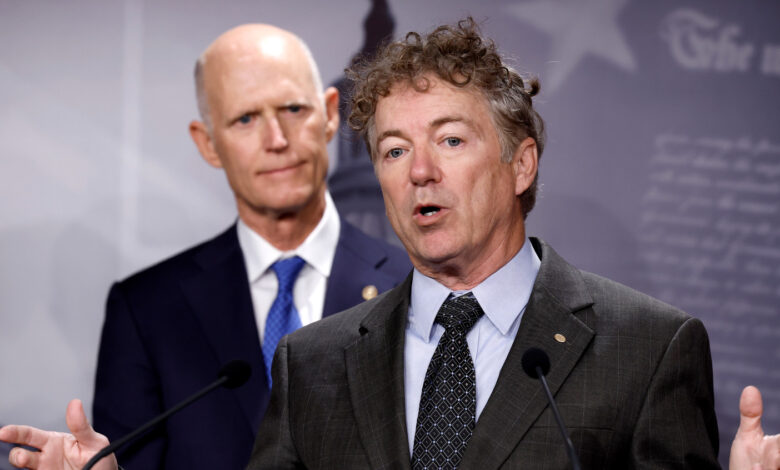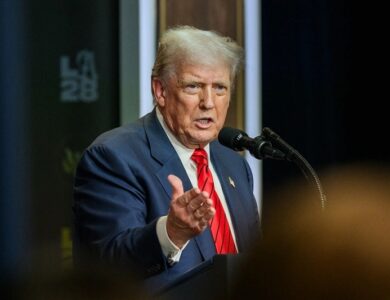Rand Paul Says Trump’s Tariffs Are ‘Taxes’ Congress Must Approve

Kentucky Republican Sen. Rand Paul once again came out against President Donald Trump, this time over the commander-in-chief’s copious use of tariffs on foreign imports in order to force countries to sign trade agreements that are more fair to the U.S.
In a post on X, the senator argued that the Constitution grants Congress the authority to impose new taxes. Since Trump’s tariffs effectively function as taxes, he claimed, they require approval from both the House and Senate.
The Trump administration and a majority of Republicans, however, consider the use of tariffs as a tool to conduct foreign policy, which is squarely in the purview of the Executive Branch.
Read more: AG Pam Bondi Shocks Democrats – She Just Threw Them In Prison
“The Constitution clearly states that Congress, not the president, has the power of the purse,” he wrote. “All new taxes (which is what a tariff is) are supposed to originate in the House of Representatives before going to the Senate for approval.”
The Constitution clearly states that Congress, not the president, has the power of the purse. All new taxes (which is what a tariff is) are supposed to originate in the House of Representatives before going to the Senate for approval.https://t.co/TyrmT7kYcE
— Rand Paul (@RandPaul) April 30, 2025
The Constitution does provide Congress with the authority to impose taxes and regulate foreign commerce through the use of tariffs. However, over the decades, Congress has also passed legislation delegating some tariff authority to presidents, such as in the case of an emergency.
On April 2, Trump “declared that foreign trade and economic practices have created a national emergency, and his order imposes responsive tariffs to strengthen the international economic position of the United States and protect American workers,” said the White House in a statement accompanying the executive order.
His remarks came just ahead of a Senate vote that would have overturned Trump’s Liberation Day tariffs, which are currently on hold, but GOP leaders managed to beat back an effort to tie the president’s hands during a Tuesday vote.
Read more: Big Development In Death Of Obama Chef Involves Former President
In addition, according to Politico, the White House also warned congressional offices that Trump would veto the bill if it reached his desk.
Paul joined GOP Sens. Susan Collins of Maine, Lisa Murkowski of Alaska, and voted with all Democrats in favor of the resolution, which failed in a 49-49 vote.
“Democrats’ efforts to pass the measure were hindered by the absence of Sen. Sheldon Whitehouse (D-R.I) , who was returning to the U.S. from South Korea,” Axios reported, adding that retiring anti-Trump Sen. Mitch McConnell, also of Kentucky, did not vote.
His office said in a statement that he has “been consistent in opposing tariffs and that a trade war is not in the best interest of American households and businesses.”
Read more: DA Fani Willis Found GUILTY – Ordered to Pay MASSIVE Fine to Trump
McConnell’s office added: “He believes that tariffs are a tax increase on everybody.”
Lawmakers have the ability to unilaterally initiate votes to disapprove of the administration’s declaration of a national emergency. On Wednesday, Senator Ron Wyden (D-Ore.) employed this strategy to call for a vote.
This Democratic approach is highlighting divisions within the Republican Party regarding concerns about rising prices and the extent to which President Trump is attempting to expand presidential powers, Axios noted further.
“I think these are more symbolic votes that Democrats are trying to engineer,” Senate Majority Leader John Thune (R-S.D.) told the outlet. “Republicans are trying to give the administration, as we said, before, some space to figure out if they can get some good deals and awaiting the results of that.”
Paul told Axios that the issue could again resurface in the near future.
Read more: New US Attorney Jeanine Pirro Announces Major Arrest
“It’s still a debate worth having, because, you know, if a month from now, we have massive tariffs go on and we have a massive sell off in the stock market, and we didn’t have a first good quarter in growth, and if it’s worse again in the second quarter, people would start asking, ‘Is it good policy, or is it a bad policy?’” he said.





